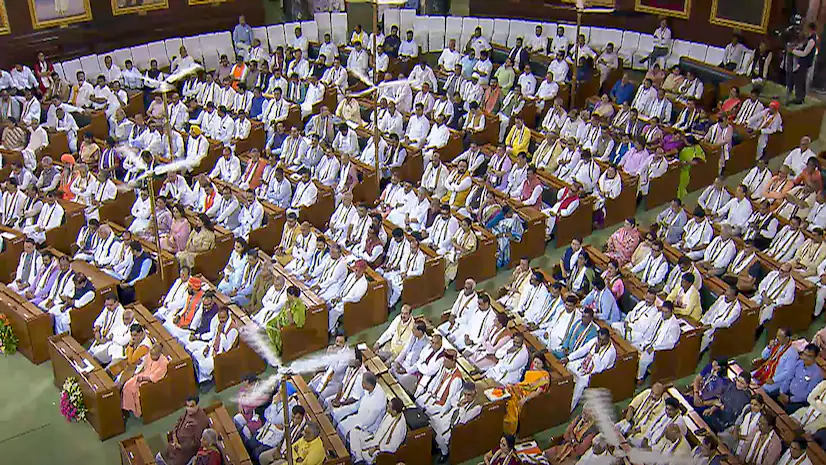
What is Lok Sabha’s Real Name?
The Lok Sabha, often referred to as the “House of the People,” plays a critical role in India’s parliamentary system. Its name, derived from the Hindi language, signifies its purpose as a representative body that embodies the will of the Indian populace. The Lok Sabha is one of the two houses of the Parliament of India, the other being the Rajya Sabha, or the “Council of States.” As the lower house, it holds significant authority over legislative matters and the formation of the government.
The translation of Lok Sabha encapsulates both its function and its democratic ethos. “Lok” translates to “people” in English, while “Sabha” means “assembly” or “house.” Hence, the term “Lok Sabha” can be viewed as “assembly of the people,” highlighting its essentiality in providing a platform where representatives of various constituencies express the concerns, aspirations, and views of their constituents. This connection between its name and function illustrates how the Lok Sabha operates at the heart of democracy in India.
The house comprises Members of Parliament (MPs) who are directly elected by citizens through general elections, which occur every five years. The number of Lok Sabha members is currently set at 543, with representation from various political parties and independent candidates. This diversity enables a range of voices to participate in the legislative process, ensuring that the interests of different segments of society are considered in shaping national policies.
Moreover, the Lok Sabha holds the power to initiate legislation, amend existing laws, and significantly influence the budget and expenditure of the country. Its status as the lower house does not diminish its importance; rather, it reinforces the concept of a bicameral democracy where both houses collaborate to enact laws that are meaningful for India’s development and progress.
Historical Context and Evolution of the Name
The term “Lok Sabha,” which translates to “House of the People,” has its origins deeply rooted in the democratic aspirations of the Indian populace. Prior to independence, legislative bodies in India were referred to by various names, reflective of the colonial governance structure and limited representation. The Indian National Congress and other political entities advocated for greater representation and autonomy, leading to significant legislative reforms in the early 20th century.
During the British Raj, legislative councils were established, which provided a platform for Indian representatives but were still predominantly under British control. The Government of India Act, 1935, introduced a more structured framework, proposing provincial legislative assemblies and a central assembly that could include Indian representatives. However, the term used for these assemblies—such as “Legislative Assembly”—did not capture the essence of a sovereign assembly representative of the populace’s will.
Post-independence, in 1950, with the adoption of the Constitution of India, the common goal of a true democratic framework emerged. The Constituent Assembly recognized the need for a name that embodied the spirit of democracy and inclusiveness. Thus, “Lok Sabha” was adopted to signify a house specifically meant for the people, ensuring that the legislative assembly was fundamentally accountable to the public it represented. The term emphasized the principle that every citizen, regardless of social or economic status, had a voice within the legislative process.
The evolution from colonial legislative councils to the current Lok Sabha illustrates a significant transition towards a more representative and participative democracy, reflecting the values enshrined in the Constitution. This transformation marked a critical chapter in India’s political history, intertwining the narrative of governance with the people’s fundamental rights and responsibilities. Thus, the name “Lok Sabha” stands not only as a term of governance but also as a symbol of democratic ideals rooted in the collective aspirations of the Indian populace.
Significance of the Real Name in Indian Democracy
The real name of the Lok Sabha has profound implications within the framework of Indian democracy. As the lower house of Parliament, it is essential for the Lok Sabha to reflect the democratic values that underpin the Indian political system. The name itself serves not only as a label but also as a representation of the public’s will and aspirations. It embodies the idea of a collective voice for the citizens, reinforcing the notion that the Lok Sabha is an institution designed to serve the interests of the electorate.
The public perception of the Lok Sabha is intricately tied to its real name. It shapes how citizens view their representational body and its role in governance. When individuals feel a connection to the name, they are more likely to engage with the political process, vote in elections, and hold their representatives accountable. This sense of belonging is crucial for fostering an informed and active citizenry, which is vital for the health of any democracy.
Moreover, the representation of the common people is encapsulated in the real name of the Lok Sabha. It emphasizes the importance of the elected representatives who bring the concerns of their constituents to the forefront of governance. Consequently, the way the Lok Sabha is perceived can directly affect the dynamics of lawmaking and policy formulation. An understanding of its name prompts citizens to consider the values and responsibilities that come with the democratic process, including the need for transparency and accountability.
The Lok Sabha, by its very nomenclature, signifies a commitment to democratic principles, political participation, and representation. In this context, the real name of Lok Sabha is not merely a matter of semantics; it plays an essential role in shaping the functions of governance, the relationship between elected representatives and their constituents, and the overall efficacy of the democratic process in India.